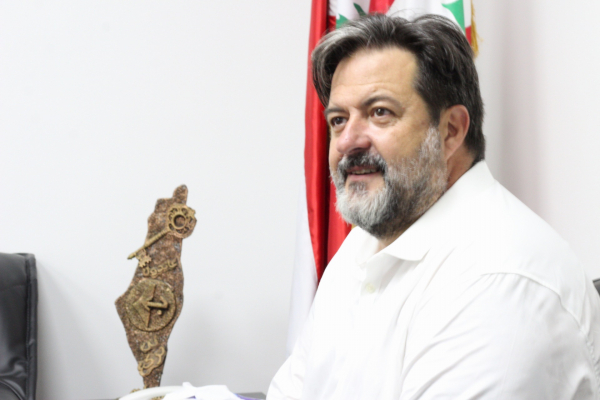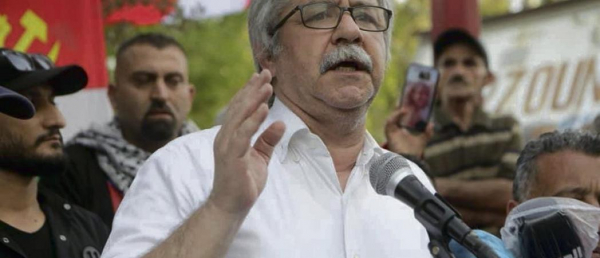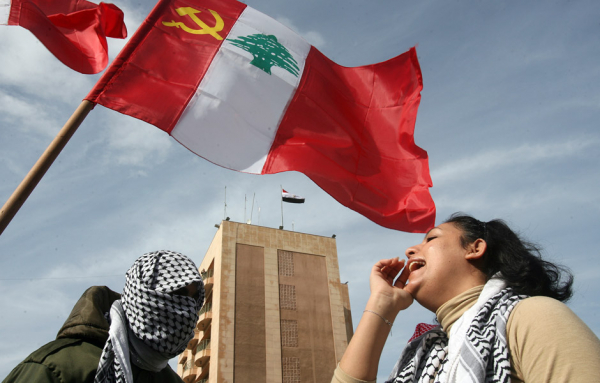Interview with Manu Pineda - The Communist Party of Spain
1- What were your observations after you visited the Beirut Port?
It was, of course, very overwhelming to see the state of the port. What happened is terrible, because of the economic importance of the port, not only for the whole of Lebanon, but also on the regional level. I would, however, like to highlight the positive role that volunteers are playing there in general. It is a very important role of popular self-organization, particularly the leading role of the Lebanese Democratic Youth organization, which is working hard with volunteers on the ground. They are also ensuring that landlords do not profit from the miseries of families who lost their homes. This explosion is the symbol of the Lebanese political system, which is a rotten and corrupt system that does not have the interests of the people at its core.
2- You said during the Press conference at the LCP headquarters that you are concerned about Macron’s visit. What do you mean exactly? Can you give more details?
I think Macron’s visit has two different dimensions to it. On the one hand there is a national, domestic dimension for France, because Macron has had several internal failures, and so he needs to sell the French population a victory to show that he can be influential, while presenting himself here as a Napoleonic figure. Lebanon is still considered under French influence even though they are no longer a colonial power. On the international level, France, as a former colonial power, is in charge of coming here to defend the interests of the international conglomeration that encompasses the European Union, the US, Israel etc. There are interests in this part of the world, which are also related to the demonstrations in Lebanon, which have been going on since October, calling for democracy and an end to corruption, among other demands. It is in the interest of this international conglomeration to either to stop the demonstrations, or to introduce other elements which will change the appearance of this system, without addressing the actual structural problems themselves, while instrumentalizing these elements to weaken other internal elements in the structure that exists. Other relevant issues could possibly be related to the gas that has supposedly been found in Lebanese waters, or the pipelines being built. However, I think these are mostly secondary issues, because Lebanon is a small country, without many natural resources. It does, on the other hand, have tremendous geo-strategic importance; therefore, they cannot lose control of this part of the world.
3- In your opinion, how can the political and economic reforms which we demanded during the October 17 uprising be achieved?
Firstly, it is important that the nature of these protests do not change, and do not turn into what the governing parties or the powerful forces want them to be. In my opinion, things are also being framed in a way after the explosion at the port to present Hariri and his system as the only option that can salvage the situation. Therefore, it is important to offer the people a project they can believe in, and I think that the progressive organizations are working very intelligently in this direction. It is key to have a program with 10 clear points, for example, which people can access and recognize that it is these progressive organizations, social movements.. etc. that are the ones making these demands. I believe that in the next weeks or months, the situation is going to be even more explosive. Right now, it seems like everything is overshadowed by the explosion, including the country's massive debt which has been perpetuated by the corrupt system and its politicians, while the Lebanese people face the consequences of this debt. Giving in to the International Monetary Fund is one of the proposed solutions, as other countries have done. This does not just create and generate further debt related to the payment of the interest. We all know that when the IMF lends money, they also impose a series of reforms, including cuts in social rights and services, which will make the suffering of the Lebanese people even more extreme. Right now, anyone can join the protests, even those who don’t actually want anything to change. But when there is a program, people are going to have to take sides, which will be the moment to win or lose it all. If you are prepared, with a program where the majority of the people feel represented, you can win the support of that majority. On the other hand, if selfish, narcissistic interests impose themselves and the different organizations are not able to agree, vying only for visibility or leadership in this coalition, then obviously this program cannot succeed.
4- The Israeli forces continue to confiscate lands, detain people, and build settlements. They will soon annex the West Bank to their territories. Do you consider this as part of the “Deal of the Century”? What is your stance on this plan?
Our position has been clear from the beginning: even the name itself is a lie, because this is not a deal, as the Palestinians have not even been given a say in the matter. Since the beginning, different North American organizations have always been strong allies of the Zionist regime. With their veto in the security council of the UN, they have always made it impossible to pass any kind of resolution against the regime in Tel Aviv. That the occupant of the White House supports the Israeli position is not something new, but what is new is that he leads the most violent, aggressive and racist positions and that he is leading a project and has an even worse position than Netanyahu. In speaking about the "deal of the century", it seems that if either Netanyahu, (provided he survives the corruption scandal) or Gants, or whoever becomes prime minister of Israel, fails to annex parts of the West Bank they’re talking about, it would be regarded as a success for those who oppose it. We cannot think like that, as this is far from being true. Although it cannot go forward in any way, we have to be conscious of the constant annexation of the West Bank, pushing forward on the ground without it being formally declared. A new element which should be highlighted is the shameful role that the feudal, medieval monarchies of the Gulf and Arabian Peninsula are playing. After the Emirates, it seems like we might have similar declarations coming from other countries like Bahrain or Oman in the next few weeks. It is something we should denounce and we hope that the people of these countries respond in kind to the terrible decisions of their governments.
5- In your opinion, what are the building blocks of any political settlement that can be reached between Palestinians and Israelis? How can Palestinians secure their rights?
If I'm to be truthful, I don’t think that it will be possible to have a fair agreement right now, with an emphasis on fairness for both Palestine and Israel, unless the role of the international community changes radically. A single worker in a big company, like McDonald’s, obviously cannot negotiate his working conditions with such a large and powerful corporation. This is a very similar situation. There is enormous inequality between the sides who, theoretically, should be negotiating. We cannot talk about negotiations when Israel has not only its enormous military power, but also international support, either direct and explicit, like from the United States, or implicit like from the European Union and other states which are closely aligned with the US. The only way to force a negotiation to solve this issue is to set a diametrical change in the role of the international community, which should impose sanctions on and isolate Israel. It is only by doing this that just negotiations can begin. In my personal opinion, the only way out of this is through one secular and democratic state in the whole of the territory of historical Palestine, where all the rights of all the people, including the right of return of all the refugees, is granted. It is the only fair solution, but that doesn’t mean I think it’s achievable today, in these conditions.
6- We have seen, during the COVID- 19 pandemic, that the USA, along with other capitalist states, have favored profits over the health of human beings. Some foreign leaders have called to apply the herd immunity principle. Do you think that the USA- and the other capitalist states- failed to address this pandemic?
They have failed depending from which perspective you look at it. Obviously, for those of us who want to put health at the center of our political goals, they have failed. A very good example of this is prime minister Boris Johnson in the UK, who was one of the defenders of this so-called “herd immunity” principle, until he himself was affected by the virus. It has also affected his credibility as a leader, bringing up the question of whether he can even continue as prime minister. We also have examples in the opposite direction, in countries where politics are effectively controlling the economy. We have seen how they have stopped and they have had positive results. We can talk about Cuba and China, where this has happened (i dont understand this part---what stopped?). In other countries, where they have prioritized the economy over political decisions, we are seeing the results of this so-called “herd immunity” system, which is obviously not working. In the US, they now have a quarter of global new cases, as the country on the top of this list. The second one is Brazil, another government aligned with the Trump administration. The third one is India, which is also part of their alliance, and we can see that these policies obviously do not have a positive impact.
7- The USA is launching a trade war against China, preventing it from owning and developing 5G technology, and accused it of spreading the Coronavirus. How do you comment on this? And what is the future of the USA-China relationship?
Some people are speaking about two different types of imperialism: US imperialism and Chinese imperialism, but we do not share this analysis at all. We believe there is one imperialism: one which has a world full of military bases and is trying to control the economy of countries while punishing, without any mercy, any country or people which does not follow what it dictates. China, with its own system, the Chinese way, socialism with Chinese characteristics, or whatever it may be called, is developing a policy which is taking it to the forefront of global economics while internally working towards the eradication of poverty. China is gaining a lot of international influence not by bombing, or sending soldiers and tanks, but by reaching agreements with other countries seeking mutual benefit. The battle is on many fronts. The technological aspect, as you mentioned, is one example. Another example is the attempt being made to block the new silk route which China is proposing. We’re seeing how EU countries, like Portugal, Italy, Greece and now Germany, have reached alliances and agreements with China regarding the new silk route and are being put under threat for doing this. I often use the example that it’s a bit like a classroom at school that has a bully who hits other children, and those who want to avoid being hit may end up helping the bully instead. What governments need to understand is that they have to change their present attitudes and now when there have been problems, for example these countries that we mentioned before which are being threatened for participating in the new silk route. Spain has had a problem with the positions of very high tariffs on certain products we produce and export to the US. Instead of looking the other way, other countries have to stand up to this US policy of threatening countries, while working together to build a more multi-polar world, based on democracy and respect for international law and human rights. We also know that governments are not going to do this on their own, so we as people need to organize in order to pressure and push them in this direction, working towards achieving peace and human rights. We’re not asking for anything more than this, we’re not even talking about achieving socialism, but in this present context, to talk about peace and human rights is already revolutionary.
8- Italy was heavily affected by COVID-19. It was expected that EU members would help this country; however, Cuba and China provided the needed aid first. How do you interpret this? What are the major disagreements between the EU member states nowadays?
I would like to start by clarifying that for us, the European Union is not a union of the people or an international organization representing the people. Our political organization has opposed the EU, because we understand that it is a space designed to implement policies in the interests of capitalists and traders. During the 2008 crisis, the EU failed blatantly and imposed a series of austerity policies on the people in the South of Europe, which had very destructive effects for the working class, particularly in Greece, which is used as a laboratory for these policies. They were put forward and implemented by German chancellor Angela Merkel, but now, in this context of the COVID pandemic, she is proposing a different solution. While it is not obviously a completely opposite solution, there is a difference. She is now proposing measures which would be able to create an immediate solution to the pandemic. While this is not enough, there is a mobilization of public resources. Other countries have played Germany's past role this time around: the Netherlands, Austria, Denmark, Sweden, Finland have not helped the most affected countries. Merkel has pushed in the opposite direction this time, not because she is particularly concerned about the interests of the people of Europe, or the people of southern Europe, but because what is at risk now is the survival of the European Union itself. What we’ve seen is that there are many EU leaders like high representative Borrell, which have launched a campaign against China. In our moment of crisis, as you have said, it was the Chinese that were providing more support than our own allies. Cuba was also sending doctors though the weight of its support was proportional to the size of the country. China's size and economic wealth made the weight of its support more easily felt, gaining popularity with the European people. The campaign launched against China's assistance in Europe implied that China was not supporting them, but rather doing propaganda for its own system. The solidarity and the mutual support that was supposed to exist inside the EU has been a complete failure, but we must also remember that our biggest ally outside the union is the United States, supposedly, though no support was requested from the US, and nobody was expecting it. Many European countries have asked for China's support, which it provided, and other European countries have asked for the support of Cuba, which it also provided, while our NATO allies are sending bombs and soldiers. We have also witnessed the terrible spectacle of attempting to steal each other's resources: the US trying to steal the German vaccine which was under trial, or Germany trying to keep masks which were on their way to Spain and Italy. While we’ve witnessed this terrible spectacle from our theoretical allies in NATO, China and Cuba were sending the necessary medical and technical support we needed. We’ve demanded, in light of this situation, that the EU analyzes this with regards to an alliance policy.
9- Lately, many European countries are witnessing the mushrooming of extreme- right groups (neo-fascists, neo-Nazis, and anti-immigrant rhetoric groups). In which context do you frame this? What is the impact of these movements on the entire political scene in Europe?
When the regimes of the systems which present themselves as democracies are unable to give an answer, or propose a solution to the demands of the working people, this is one of the risks. We live in systems in which there is massive unemployment; there are people who work and have jobs, but are still poor and cannot make ends meet. There are massive problems with precariousness and lack of future prospects. Within this climate, there are a lot of forces that are trying to distract attention from these problems, and the ones who have caused them, by pinning the blame on migrants, to give one example. Instead of presenting them as our brothers who are also being exploited, and in much worse conditions, they are painted as the enemy, coming here to steal our jobs. We believe the best vaccine against the far right is social justice, in the sense that as long as governments are able to guarantee the rights and the wellbeing of the working class, these extreme positions will not gain ground. To answer the second part of the question, about the impact the far-right is having, its indirect impact is greater than the one that corresponds to its election performance only. This is because many groups or parties, which although not openly far right, are implementing or supporting their policies. I could give many examples of votes on important issues in the European parliament, where social democrats, or sometimes even green party representatives are voting with conservatives or even the far right. Even when they don’t have a majority, they are reaching a position of hegemony within the EU, because they are managing to make others walk their political line.



